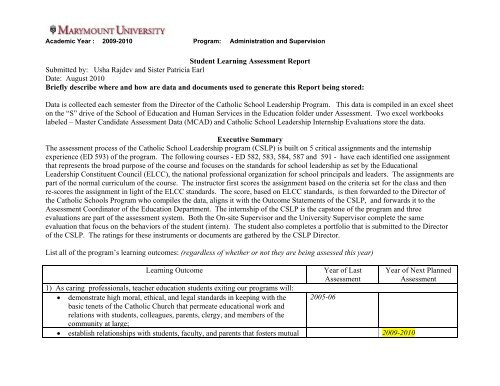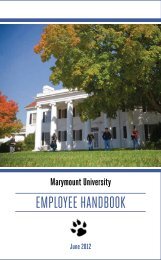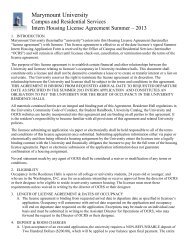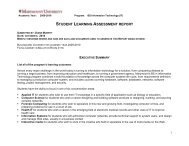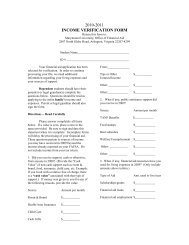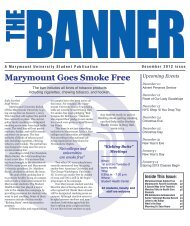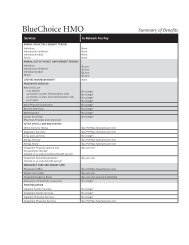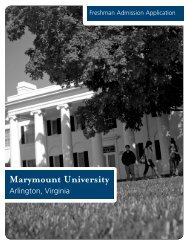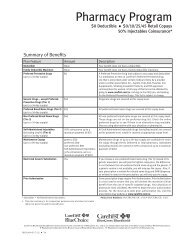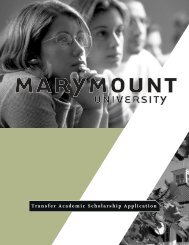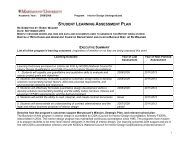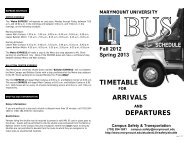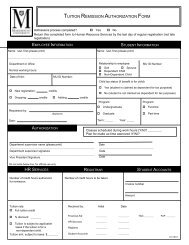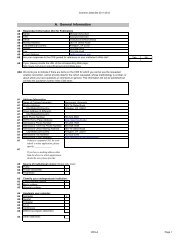Student Learning Assessment Report Submitted by: Usha Rajdev ...
Student Learning Assessment Report Submitted by: Usha Rajdev ...
Student Learning Assessment Report Submitted by: Usha Rajdev ...
Create successful ePaper yourself
Turn your PDF publications into a flip-book with our unique Google optimized e-Paper software.
Academic Year : 2009-2010 Program: Administration and Supervision<br />
<strong>Student</strong> <strong>Learning</strong> <strong>Assessment</strong> <strong>Report</strong><br />
<strong>Submitted</strong> <strong>by</strong>: <strong>Usha</strong> <strong>Rajdev</strong> and Sister Patricia Earl<br />
Date: August 2010<br />
Briefly describe where and how are data and documents used to generate this <strong>Report</strong> being stored:<br />
Data is collected each semester from the Director of the Catholic School Leadership Program. This data is compiled in an excel sheet<br />
on the “S” drive of the School of Education and Human Services in the Education folder under <strong>Assessment</strong>. Two excel workbooks<br />
labeled – Master Candidate <strong>Assessment</strong> Data (MCAD) and Catholic School Leadership Internship Evaluations store the data.<br />
Executive Summary<br />
The assessment process of the Catholic School Leadership program (CSLP) is built on 5 critical assignments and the internship<br />
experience (ED 593) of the program. The following courses - ED 582, 583, 584, 587 and 591 - have each identified one assignment<br />
that represents the broad purpose of the course and focuses on the standards for school leadership as set <strong>by</strong> the Educational<br />
Leadership Constituent Council (ELCC), the national professional organization for school principals and leaders. The assignments are<br />
part of the normal curriculum of the course. The instructor first scores the assignment based on the criteria set for the class and then<br />
re-scores the assignment in light of the ELCC standards. The score, based on ELCC standards, is then forwarded to the Director of<br />
the Catholic Schools Program who compiles the data, aligns it with the Outcome Statements of the CSLP, and forwards it to the<br />
<strong>Assessment</strong> Coordinator of the Education Department. The internship of the CSLP is the capstone of the program and three<br />
evaluations are part of the assessment system. Both the On-site Supervisor and the University Supervisor complete the same<br />
evaluation that focus on the behaviors of the student (intern). The student also completes a portfolio that is submitted to the Director<br />
of the CSLP. The ratings for these instruments or documents are gathered <strong>by</strong> the CSLP Director.<br />
List all of the program’s learning outcomes: (regardless of whether or not they are being assessed this year)<br />
<strong>Learning</strong> Outcome<br />
Year of Last<br />
<strong>Assessment</strong><br />
1) As caring professionals, teacher education students exiting our programs will:<br />
demonstrate high moral, ethical, and legal standards in keeping with the 2005-06<br />
basic tenets of the Catholic Church that permeate educational work and<br />
relations with students, colleagues, parents, clergy, and members of the<br />
community at large;<br />
establish relationships with students, faculty, and parents that fosters mutual 2009-2010<br />
Year of Next Planned<br />
<strong>Assessment</strong>
Academic Year : 2009-2010 Program: Administration and Supervision<br />
respect<br />
exhibit an effective and caring attitude that seeks to develop the whole child<br />
intellectually, physically, emotionally, socially, as well as spiritually,<br />
motivated <strong>by</strong> the example of Jesus Christ, the Servant Leader;<br />
understand the importance of role modeling, and demonstrate sound virtues<br />
for students and faculty;<br />
exemplify a love of teaching, appreciation of diversity, respect for the unique<br />
gifts and talents of all, and the importance of integrating the values of faith<br />
rooted in Christian charity for all into the daily life of the school.<br />
As critical thinkers, teacher education students exiting our programs will:<br />
demonstrate exceptional knowledge of the concepts, theories, and tools of inquiry<br />
related to educational leadership and necessary for the effective management of<br />
schools;<br />
demonstrate perceptive and analytical abilities that impact student learning and<br />
development, as well as faculty/staff growth and development<br />
demonstrate effective problem solving skills that generate multiple solutions for<br />
practical decision-making that can affect the school, parish, and wider community.<br />
As effective practitioners, teacher education students exiting our programs will:<br />
employ appropriate and effective planning processes and leadership strategies<br />
based on knowledge of content, learner characteristics, and the community related<br />
to educational leadership and necessary for instruction in schools;<br />
differentiate curriculum and instruction to accommodate students of all<br />
exceptionalities and connect curriculum goals and objectives to diocesan, local,<br />
state and national standards;<br />
understand the development and use of formal and informal assessment techniques<br />
for student learning, as well as supervision strategies and formative and summative<br />
evaluations for faculty/staff growth and development;<br />
employ sound strategies in budget planning, as well as in short and long term<br />
development goals;<br />
understand basic legal issues and demonstrate knowledge of resources related to<br />
safe and effective management of school issues<br />
2006-07<br />
2007-08<br />
2006-07<br />
2007-08<br />
2005-06<br />
2006-07<br />
2007-08<br />
2008-09<br />
2010-2011<br />
2008-09<br />
2009-2010<br />
2009-2010<br />
2010-2011<br />
2008-2009
Academic Year : 2009-2010 Program: Administration and Supervision<br />
Describe how the program’s outcomes support Marymount’s Mission, Strategic Plan, and relevant school plan:<br />
The outcomes of the Catholic School Leadership Program fall into the three broad categories of preparing teachers to become caring<br />
professionals, critical thinkers, and effective practitioners.<br />
University’s mission statement is supported in the following ways:<br />
prepare students to be thoughtful and effective persons within family, community, and society – Critical Thinker, Caring<br />
Professional and Effective Practitioner as evidenced<br />
develop students with the competencies necessary for entry, growth, and success in their chosen careers – Critical Thinker and<br />
Effective Practitioner;<br />
build within its students a shared sense of community among individuals drawn from diverse national, cultural, and social<br />
backgrounds – Caring Professional and Effective Practitioner;<br />
foster in its students a spirit of service to others, a concern for social justice, and a commitment to living in an ethically responsible<br />
way – Caring Professional;<br />
develop in students both the competencies and the motivation to be lifelong learners – Critical Thinker and Effective Practitioner.<br />
The University’s Strategic Plan is supported in the following Outcome Statements:<br />
Academic Excellence:<br />
demonstrate exceptional knowledge of the concepts, theories, and tools of inquiry related to educational leadership and necessary for<br />
the effective management of schools;<br />
demonstrate perceptive and analytical abilities that impact student learning and development, as well as faculty/staff growth and<br />
development<br />
demonstrate effective problem solving skills that generate multiple solutions for practical decision-making that can affect the school,<br />
parish, and wider community.<br />
employ appropriate and effective planning processes and leadership strategies based on knowledge of content, learner characteristics,<br />
and the community related to educational leadership and necessary for instruction in schools;<br />
differentiate curriculum and instruction to accommodate students of all exceptionalities and connect curriculum goals and objectives<br />
to diocesan, local, state and national standards;<br />
understand the development and use of formal and informal assessment techniques for student learning, as well as supervision<br />
strategies and formative and summative evaluations for faculty/staff growth and development;
Academic Year : 2009-2010 Program: Administration and Supervision<br />
Catholic Identity:<br />
<br />
<br />
<br />
<br />
<br />
demonstrate high moral, ethical, and legal standards in keeping with the basic tenets of the Catholic Church that permeate<br />
educational work and relations with students, colleagues, parents, clergy, and members of the community at large;<br />
establish relationships with students, faculty, and parents that fosters mutual respect<br />
exhibit an effective and caring attitude that seeks to develop the whole child intellectually, physically, emotionally, socially, as<br />
well as spiritually, motivated <strong>by</strong> the example of Jesus Christ, the Servant Leader;<br />
understand the importance of role modeling, and demonstrate sound virtues for students and faculty;<br />
exemplify a love of teaching, appreciation of diversity, respect for the unique gifts and talents of all, and the importance of<br />
integrating the values of faith rooted in Christian charity for all into the daily life of the school.<br />
Provide a brief description of the assessment process used including strengths, challenges and planned improvements:<br />
Description of Direct Measures: (rubrics attached)<br />
Each Critical Assignment uses the same rubric that asks professors to rate the assignment on the 7 ELCC standards<br />
(attached). Exceeds Expectations ratings are given a numerical score of 4, Meets Expectations ratings are given a score of<br />
3, Developing Toward Expectations ratings are given a score of 2, and Does Not Meet Expectation rating of 1.<br />
The following are descriptions of the Critical Assignments for ED 582, ED 583, ED 584, and ED 591 cited for each of the <strong>Learning</strong><br />
Outcomes below:<br />
1) ED 582 - Building the Faith Community - Critical Assignment: Cumulative Project - <strong>Student</strong>s are required to submit a12-14<br />
page paper, double-spaced, APA style which includes the following: a) Personal mission statement; b) Back-to-School Opening<br />
Remark, and c) Case Scenario Response.<br />
2) ED 583 Catholic School Administration - Critical Assignment: FINAL PROJECT – <strong>Student</strong>s are asked to submit a paper<br />
based on the following scenario: You have been asked <strong>by</strong> your superintendent to present a paper to a group of teachers who would<br />
like to be Catholic school principals. Since you have been an exemplary principal for several years, she has asked you to speak on the<br />
topic of the administration of a Catholic school. Your paper will also be given to all of the new principals in the diocese. You need to<br />
describe your vision of the role of a principal. She has asked you to be sure to include the following information and provide practical<br />
examples in your presentation. You should also link the various sections to specific ELCC Standards.<br />
Leadership Theories and their practical application to the leader in a Catholic school
Academic Year : 2009-2010 Program: Administration and Supervision<br />
<br />
<br />
<br />
<br />
<br />
<br />
<br />
Organizational Theories and their practical application in leading a Catholic school<br />
Motivation Theories and the role they play in the selection and supervision of teachers in a Catholic school<br />
Instituting change in a Catholic school<br />
Creating a decision making process that works in a Catholic school<br />
Resolving conflicts within a Catholic school community<br />
Integrating the Catholic faith or spirituality into your role as principal<br />
Your personal views on the role of a Catholic school principal.<br />
3) ED 584 - Advanced Curriculum for Educational Leadership - Critical Assignment: Final Curriculum Project – <strong>Student</strong>s are<br />
asked to identify a curriculum related issue within their own Catholic school or the Catholic school they hope to lead one day and<br />
receive approval form the professor for this topic. Describe the issue or problem and a program/plan for addressing it, including the<br />
following:<br />
• How your program aligns with your philosophy of Catholic education<br />
• How your program aligns with your Catholic school’s mission<br />
• How you will address cultural and religious differences of students, teachers, and/or families<br />
• How you will address students with special needs (i.e., learning disabilities, limited English proficiency)<br />
• The responsibilities or involvement of the various stakeholders, to the extent appropriate, in implementing this<br />
program – including principal, teachers, students, parents, pastor, superintendent, and others outside the<br />
immediate school community<br />
• How you will use technology to implement this program<br />
• How you will communicate and garner support for this program among the various stakeholders<br />
• How you will evaluate the effectiveness of this program<br />
4) ED 591 Catholic Schools Finance & Development - Critical Assignment: - Financial Plan Project: This course will<br />
conclude with a final project in which students are asked to produce a budget for a new school and a plan for your institutional<br />
advancement effort. There are two parts to your final project: Budget and Advancement<br />
Indirect Measures: (Evaluation instruments or surveys attached)<br />
In ED 593 Internship, the rubrics of the on-site advisor as well as the Marymount Supervisor include some narrative<br />
based on observation and interaction throughout the process (See attached rubrics). In addition, as part of the Portfolio (See<br />
Portfolio Manual), students provide self-assessment and reflection of each course in relation to the ELCC standards as well<br />
as the three major outcomes for all completing the program; namely, caring professional, critical thinking, and effective
Academic Year : 2009-2010 Program: Administration and Supervision<br />
practitioner. All students are rated on a scale. Exceeds Expectations ratings are given a numerical score of 4, Meets<br />
Expectations ratings are given a score of 3, Developing Towards Expectations ratings are given a score of 2, and Does Not<br />
Meet Expectation rating of 1.<br />
Describe how the program implemented its planned improvements from last year:<br />
Provide a response to last year’s University <strong>Assessment</strong> Committee review of the program’s learning assessment report: (List each<br />
recommendation and provide a specific response to each).<br />
No recommendations were given.
Academic Year : 2009-2010 Program: Administration and Supervision<br />
Outcome and Past <strong>Assessment</strong><br />
<strong>Learning</strong> Outcome 1: As caring professionals, establish relationships with students, faculty, and parents that fosters mutual<br />
respect;<br />
Is this outcome being reexamined? Yes XX No<br />
<strong>Assessment</strong> Activity<br />
Outcome<br />
Measures<br />
Explain how<br />
student<br />
learning will<br />
be measured<br />
and indicate<br />
whether it is<br />
direct or<br />
indirect.<br />
Critical<br />
Assignmen<br />
ts for ED<br />
582 and<br />
583(Direct)<br />
<br />
On-site<br />
advisor<br />
Evaluations<br />
(Indirect)<br />
Performance Standard<br />
Define and explain<br />
acceptable level of student<br />
performance.<br />
Critical Assignment Ratings<br />
for ELCC Standards 1 -<br />
School Vision of <strong>Learning</strong>, 4<br />
- Community Involvement, 5<br />
- Ethical and Moral<br />
Professionalism from the<br />
Critical Assignment will be at<br />
an aggregated mean of 3.5 out<br />
of a possible 4<br />
Aggregated ratings from Onsite<br />
Advisors on criteria<br />
statements dealing with<br />
caring professionals, ability to<br />
work with staff, communicate<br />
with faculty, and relate to<br />
Data Collection<br />
Discuss the data collected and student population<br />
Means<br />
for<br />
<strong>Student</strong><br />
s n= 17<br />
ELCC<br />
Standar<br />
d I<br />
ELCC<br />
Standar<br />
d 4<br />
ELCC<br />
Standar<br />
d 5<br />
ED 582 3.52 3.81 3.82<br />
ED 583 3.94 3.85 4.00<br />
On-site advisors ratings for:<br />
caring professionals 3.90<br />
ability to work with 3.94<br />
staff<br />
communicate with 3.58<br />
faculty<br />
Analysis<br />
1) Describe the analysis<br />
process.<br />
2) Present the findings of the<br />
analysis including the numbers<br />
participating and deemed<br />
acceptable.<br />
Of the 17 students who<br />
graduated in 2010, in ED 582,<br />
all were at the aggregated<br />
level for Standards 1, 4 & 5.<br />
ED 583 scored a 4.00 rating in<br />
STD 5<br />
In ED 582, Standard 1, two<br />
students were at an Acceptable<br />
rating.<br />
All 17 students were at the<br />
Aggregate rating in each of the<br />
areas but in the communicating<br />
with faculty criteria two<br />
students rated at an Acceptable<br />
level. .
Academic Year : 2009-2010 Program: Administration and Supervision<br />
<br />
University<br />
Supervisor<br />
Evaluation<br />
(Indirect)<br />
students and spiritual<br />
relationships will be at 3.0<br />
Aggregated ratings from<br />
University Supervisor ELCC<br />
Standards 1 - School Vision<br />
of <strong>Learning</strong>, 4 - Community<br />
Involvement, 5 - Ethical and<br />
Moral Professionalism from<br />
the Critical Assignment will<br />
be at an aggregated mean of<br />
3.0 out of a possible 4<br />
relate to students 3.79<br />
University Supervisors ratings for:<br />
Mean<br />
s n=<br />
17<br />
ELCC<br />
Standar<br />
d I<br />
ELCC<br />
Standar<br />
d 4<br />
ELCC<br />
Standar<br />
d 5<br />
3.79 3.76 3.95<br />
All 17 students were at the<br />
Aggregate rating for each of<br />
these standards.<br />
Interpretation of Results<br />
Extent this <strong>Learning</strong> Outcome has been achieved <strong>by</strong> students (Use both direct and indirect measure results):<br />
ELCC Standards 1 - School Vision of <strong>Learning</strong>, 4 - Community Involvement, and 5 - Ethical and Moral Professionalism from the<br />
Critical Assignment met the aggregated rating for all students. Advisors on criteria statements dealing with caring professionals,<br />
ability to work with staff, communicate with faculty, and relate to students and spiritual relationships were met <strong>by</strong> all students at an<br />
Aggregated rating also. University Supervisor rated all ELCC Standards 1 - School Vision of <strong>Learning</strong>, 4 - Community Involvement,<br />
5 - Ethical and Moral Professionalism from the Critical Assignment very favorably.<br />
Program strengths and opportunities for improvement relative to assessment of outcome:<br />
The syllabus for each of these courses is (ED 582 & ED 583) focused on developing candidates ability to understand the importance<br />
of role modeling, and demonstrate sound virtues for students and faculty as indicated <strong>by</strong> the data. In addition, qualitative data analysis<br />
of the candidates’ progress reports, On-site advisor Evaluations, and University Supervisor Evaluations does indicate a strong<br />
perception of students’ ability to demonstrate the importance of role modeling and the high priority to witness to sound virtues for<br />
students and faculty, especially in a Catholic School. The University Supervisor Evaluations and the Portfolio Evaluations at the end<br />
of the program also show students are highly motivated and engaged in on-going and life-long development of virtue. The student
Academic Year : 2009-2010 Program: Administration and Supervision<br />
interaction on the Discussion Board is an added program strength in that all students give evidence of these qualities as they work<br />
through the various topics and issues for discussion.<br />
Discuss planned curricular or program improvements for this year based on assessment of outcome:<br />
In order to provide candidates with a greater opportunity for Community Involvement (Standard 4), the Coordinator of the Catholic<br />
School Leadership Program will emphasize the importance of greater Community Involvement in working with the interns and in<br />
advising the on-site advisors of the types and kinds of experiences that are needed. In addition, the Virginia Department of Education<br />
requirements for licensure now require that each student gives evidence of multiple and diverse experiences. This will enable interns<br />
to engage with more diverse communities.
Academic Year : 2009-2010 Program: Administration and Supervision<br />
Outcome and Past <strong>Assessment</strong><br />
<strong>Learning</strong> Outcome 2: As effective practitioners, differentiate curriculum and instruction to accommodate students of all<br />
exceptionalities and connect curriculum goals and objectives to diocesan, local, state and national standards;;<br />
Is this outcome being reexamined? Yes X No<br />
.<br />
<strong>Assessment</strong> Activity<br />
Outcome Measures<br />
Explain how student<br />
learning will be<br />
measured and indicate<br />
whether it is direct or<br />
indirect.<br />
Critical Assignments for<br />
ED 583 and 591 (Direct)<br />
On-site Advisor<br />
Evaluation<br />
Performance Standard<br />
Define and explain<br />
acceptable level of<br />
student performance.<br />
Aggregated means for<br />
ELCC Standard s # 2<br />
Knowledge to Promote<br />
<strong>Student</strong> Success, and #6 -<br />
The larger Educational<br />
Context in these Critical<br />
Assignments will be 3.5<br />
out of a possible 4<br />
Aggregated means for<br />
criteria statements<br />
dealing with<br />
Organizational and Task<br />
Performance, Ability to<br />
Delegate, Initiative and<br />
Responsibility,<br />
Motivation and<br />
Knowledge of Concepts<br />
will be at 3.0 or higher<br />
Data Collection<br />
Discuss the data collected and student<br />
population<br />
ELCC<br />
Standard<br />
2<br />
ELCC<br />
Standard<br />
6<br />
ED 583 3.94 3.90<br />
ED 591 4.00 4.00<br />
On-site advisors rating for:<br />
Ability to Work with Staff 3.94<br />
Ability to Cope with Stress 3.47<br />
Ability to Communicate with 3.58<br />
Faculty<br />
Ability to Relate to <strong>Student</strong>s 3.81<br />
Analysis<br />
1) Describe the analysis process.<br />
2) Present the findings of the<br />
analysis including the numbers<br />
participating and deemed<br />
acceptable.<br />
Of the 17 students who graduated in<br />
2010, in ED 583, all students met<br />
Aggregated ratings in both the<br />
standards.<br />
In ED 591, all exceeded the<br />
Aggregated rating.<br />
All 17 students were at the<br />
acceptable level or the Aggrgated<br />
rating in each of these areas. Ability<br />
to cope criteria showed an<br />
Acceptable rating due to the two<br />
students who scored at an<br />
Acceptable rating.
Academic Year : 2009-2010 Program: Administration and Supervision<br />
for all exiting candidates.<br />
University Supervisor<br />
Evaluation<br />
Aggregated means for<br />
ELCC Standard s# 2-<br />
Knowledge to Promote<br />
<strong>Student</strong> Success , and #6<br />
- The larger Educational<br />
Context in these Critical<br />
Assignments will be 3.<br />
out of a possible 4<br />
University Supervisor’s rating for:<br />
ELCC Standard #2 3.63<br />
ELCC Standard #6 3.53<br />
All 17 students were at the<br />
Aggrgated rating but again the two<br />
students rated at an acceptable level<br />
for each of these standards<br />
Interpretation of Results<br />
Extent this <strong>Learning</strong> Outcome has been achieved <strong>by</strong> students (Use both direct and indirect measure results):<br />
Aggregated means for ELCC Standard s # 2 Knowledge to Promote <strong>Student</strong> Success, and #6 - The larger Educational Context in<br />
these Critical Assignments was attained <strong>by</strong> all students.<br />
Program strengths and opportunities for improvement relative to assessment of outcome:<br />
In ED 583, students are introduced into a wide variety of concepts, theories, and tools of inquiry related to educational leadership and<br />
necessary for the effective management of schools. They are required to apply these in solving case studies and to dialog and discuss<br />
related experiences as part of their Discussion Board. The Final Project (Critical Assignment) requires them to create a “Game Plan”<br />
in which they must highlight significant theories, concepts and methods of inquiry that they will employ in their own effective school<br />
management. This Game Plan assignment is outlined at the beginning of the course so that candidates may continue to fine tune it and<br />
seek personal improvement throughout the course in these areas.<br />
In ED 591, students must utilize the knowledge and concepts of administration and also develop knowledge of concepts, theories and<br />
tools of inquiry related to effective managing the budget, creating a five year plan for finances, and creating a strategic plan that<br />
includes development. They are required to create a school budget, as well as create a five- year plan as part of the final project<br />
(critical assignment). Topics related to effective management, budget, and issues of finance and of development are topics discussed<br />
in the Discussion Board. The dialog exchange helps students to sharpen their methods of inquiry and grow in their knowledge and
Academic Year : 2009-2010 Program: Administration and Supervision<br />
application of concepts and theories related to finance and development. As a result all students received a score of 4.00 in both of the<br />
standards measured.<br />
The final Portfolio that students now complete for the CSLP also offers students an opportunity to self-reflect and evaluate their own<br />
progress so that they know the areas where they need to put forth more effort to grow and develop. They also learn to recognize their<br />
areas of experience or confidence.<br />
Discuss planned curricular or program improvements for this year based on assessment of outcome:<br />
In general, the On-Site evaluation is one that continues to develop. Because students are full time teachers or principals and do<br />
internships in their own schools, it can be difficult to motivate the On-site Advisor to work with the intern in providing a variety of<br />
real life-like experiences. The evaluations given <strong>by</strong> On-site advisors are subjective based on what they have or have not observed.<br />
Lack of observation is often due to the fact that the On-site Advisor does not provide the opportunity for a given experience. This is<br />
especially true if the candidate is a teacher; whereas those who are principals are engaged in their daily administration of the school<br />
under the guidance of their superintendent. The Coordinator of the Catholic School Leadership Program will continue to fine tune the<br />
responsibilities of the On-site Advisors and provide suggestions for candidate experiences.<br />
Though meeting expected standards, the lowest scores for this <strong>Learning</strong> Outcome were for the “Coping with stress and<br />
communicating with faculty.” This is hard even for most experienced principals, especially in Catholic schools where administrative<br />
staff is often quite limited. The students rate themselves on this and acknowledge that they know they need to do more with in these<br />
areas. These are the areas where candidates learn <strong>by</strong> doing. Working with On-site Advisors to give students more experiences where<br />
they can take the lead, learn to communicate with faculty, and cope with daily stress levels may help to buld up student confidence in<br />
these areas.
Academic Year : 2009-2010 Program: Administration and Supervision<br />
Outcome and Past <strong>Assessment</strong><br />
<strong>Learning</strong> Outcome 3: As critical thinkers, demonstrate effective problem solving skills that generate multiple solutions for practical<br />
decision-making that can affect the school, parish, and wider community.<br />
Is this outcome being reexamined? Yes X No<br />
If yes, give a brief summary of previous results (including trends) and any changes made to the program.<br />
<strong>Assessment</strong> Activity<br />
Outcome Measures<br />
Explain how student<br />
learning will be<br />
measured and indicate<br />
whether it is direct or<br />
indirect.<br />
Critical Assignments for<br />
ED 587 and 591<br />
(Direct)<br />
On-Site Supervisor<br />
Evaluations (Indirect)<br />
University Supervisor’s<br />
Evaluation<br />
Performance Standard<br />
Define and explain<br />
acceptable level of<br />
student performance.<br />
Aggregated means for<br />
ELCC Standards # 3 0<br />
Managerial Leadership<br />
& 6 Larger School<br />
Context for these<br />
Critical Assignments<br />
will be 3.5 or higher<br />
Aggregated means for<br />
criteria statements<br />
dealing with Legal<br />
Issues will be at 3.0 or<br />
higher for all exiting<br />
candidates.<br />
Aggregated means for<br />
ELCC Standards # 3 &<br />
6 for these Critical<br />
Assignments will be 3.0<br />
Data Collection<br />
Discuss the data collected and student<br />
population<br />
ELCC<br />
Standard<br />
3<br />
ELCC<br />
Standard<br />
6<br />
Means<br />
ED 591 4.00 4.00<br />
ED 587 4.00 4.00<br />
On-Site rating for:<br />
Response to Legal Issues 3.58<br />
Problem Analysis 3.69<br />
Decision Making 3.58<br />
University Supervisor’s rating for:<br />
ELCC Standard #3 3.68<br />
ELCC Standard #6 3.53<br />
Analysis<br />
1) Describe the analysis process.<br />
2) Present the findings of the<br />
analysis including the numbers<br />
participating and deemed<br />
acceptable.<br />
All 17 students exceeded the<br />
Aggregated ratings in each of<br />
these areas.<br />
All 17 students were at an<br />
Aggregated rating in all the three<br />
criteria statements with two<br />
students receiving an Acceptable<br />
scoring<br />
All 17 students met at an<br />
Aggregated rating with two<br />
students meeting at an<br />
Acceptable rating in each of
Academic Year : 2009-2010 Program: Administration and Supervision<br />
or higher<br />
these areas.<br />
Interpretation of Results<br />
Extent this <strong>Learning</strong> Outcome has been achieved <strong>by</strong> students (Use both direct and indirect measure results):<br />
ELCC Standards # 3 0 Managerial Leadership & 6 Larger School Context for these Critical Assignments indicated all students<br />
exceeded the Aggregated rating. This is indicative of a strong understanding of the application of the statements.<br />
Program strengths and opportunities for improvement relative to assessment of outcome:<br />
In Ed 587, students engage in case studies related to legal issues in daily school events. They also do legal in-baskets and analyze<br />
various court cases related to school issues. A most valuable experience is their final project (Critical Assignment) in which they<br />
review and revise their own school parent-student handbook and faculty handbook, applying legal standards and theory in their<br />
revisions. Even with the online delivery of this course, students engage lively with the professor and receive on-going feedback on<br />
their handbook revisions. Discussion Board allows students to demonstrate knowledge and share in the collective review of issues to<br />
enable candidates to use resources and become aware of practical ways to insure a safe and effective school climate and effective<br />
management that is sensitive to legal issues. These students have mastered the skills related to ED587.<br />
In ED 591, students must utilize the knowledge and concepts of resources related to safe and effective management of school issues.<br />
They are required to create a school budget, as well as create a five- year plan as part of the final project (critical assignment). Topics<br />
related to effective management, budget, and issues of finance and of development are topics discussed in the Discussion Board. The<br />
dialog exchange helps students to sharpen their methods of inquiry and grow in their knowledge and application of concepts and<br />
theories related to finance and development. Under the current economical conditions these students seemed to have mastered the<br />
concept and its application well.


